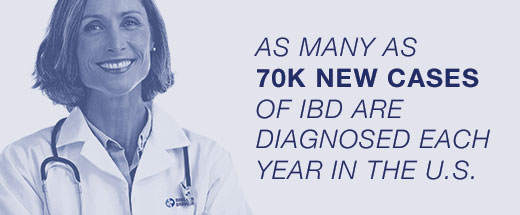Inflammatory bowel disease affects 1.4 million Americans, with the onset of symptoms appearing between ages 15-80. While research has not found an exact cause of IBD, it is thought to result from a combination of genetics, environmental factors and abnormal mucosal immune response.
IBD affects the digestive tract, or the part of the body that takes in and breaks down food. Unlike irritable bowel syndrome (IBS), IBD includes recurring symptoms of abdominal pain, bloating and altered bowel function due to inflammation in some part of the intestines.
When your body is working normally, your immune system kills germs and “bad” cells that could turn into cancer. With IBD, your body attacks the healthy cells of the digestive tract lining. This is called autoimmune response and causes inflammation leading to sores (ulcers), bleeding, strictures, obstruction and abscesses requiring surgical resection.

Symptoms of IBD include:
- Loss of appetite
- Weight loss
- Fatigue
- Night sweats
- Loss of menstrual cycle
- Fever
Risk factors for IBD:
- Smoking - Smoking cigarettes significantly increases the risk of developing Crohn’s disease, and the risk of surgery for people with Crohn’s.
- Diet - A diet high in fat and refined foods can play a role in the development of IBD, especially Crohn’s disease.
- Age - Most IBD patients are diagnosed by age 30, but some may develop Crohn’s or ulcerative colitis later in life.
- Ethnicity - Caucasians and people of Ashkenazi Jewish descent have a higher risk of developing IBD.
- Family history - Your risk of developing IBD may be higher if you have a first-degree relative (parent, sibling, child) with the disease.
The two main types of inflammatory bowel disease (IBD) are Crohn's disease and ulcerative colitis.
Crohn’s disease
Crohn’s disease is a form of IBD that can involve any part of the gastrointestinal tract, but most commonly affects the end of the small bowel and the beginning of the colon, affecting the deeper layers of the digestive lining. Crohn’s disease can occur at any age but most often starts between the ages of 15-35.
Symptoms of Crohn’s disease include:
- Abdominal pain
- Diarrhea
- Fatigue
- Weight loss
- Mouth sores
- Eye inflammation
- Skin rash
- Fistula (abnormal connection between an organ, vessel or intestine and another structure)
If you are experiencing symptoms of Crohn's, contact your gastroenterologist today.
Ulcerative colitis
Ulcerative colitis (UC), like Crohn’s disease, is an autoimmune response developed from inflammation in the digestive tract. However, UC almost always affects the rectum and lower part ofthe colon, but can affect the entire colon, then called pancolitis. This inflammation causes ulcers, or open sores, leading to bleeding and diarrhea.
Symptoms of ulcerative colitis include:
- Bloody diarrhea (typically small volume)
- Mucus discharge from the rectum
- Mild, crampy abdominal pain
- Incomplete sensation of bowel evacuation
- Inflammation of large joints such as the hips or knees, causing swelling and pain
- Inflammation of the eyes and skin
- Weight loss



